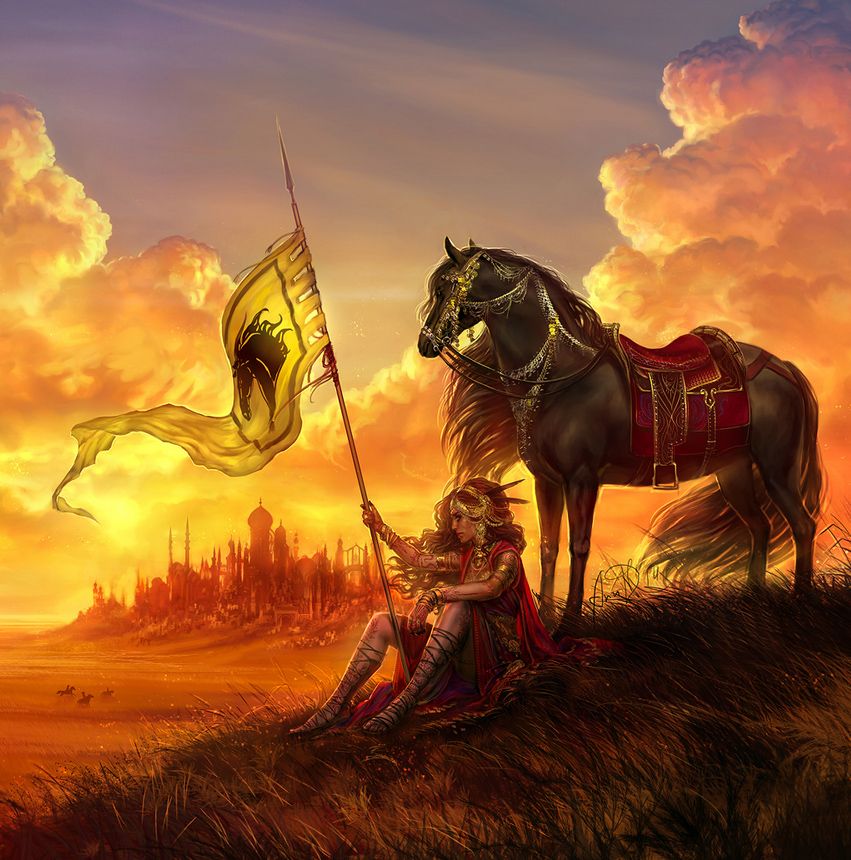Difference between revisions of "Paladin's Warhorse"
Tao alexis (talk | contribs) |
m |
||
| Line 1: | Line 1: | ||
| − | [[File:Paladin-warhorse-image.jpg|400px|left]] | + | [[File:Paladin-warhorse-image.jpg|400px|left]][[Category:Lacks Chart]] |
Also known as mearas, an unusual breed of [[Horse (wild)|wild horses]], the largest of which are chosen by a benevolent holy spirit called a luris, or being of light. Thereafter the spirit and the mearas become one, becoming familiar as a [[Paladin (class)|paladin’s]] warhorse. The animal is as [[Intelligence (ability stat)|intelligent]] and long-lived as any [[Human Race & Physiology|human]] or [[demi-human]], and literally exists to serve the paladin once they have achieved sufficient power. | Also known as mearas, an unusual breed of [[Horse (wild)|wild horses]], the largest of which are chosen by a benevolent holy spirit called a luris, or being of light. Thereafter the spirit and the mearas become one, becoming familiar as a [[Paladin (class)|paladin’s]] warhorse. The animal is as [[Intelligence (ability stat)|intelligent]] and long-lived as any [[Human Race & Physiology|human]] or [[demi-human]], and literally exists to serve the paladin once they have achieved sufficient power. | ||
Revision as of 19:33, 24 August 2020
Also known as mearas, an unusual breed of wild horses, the largest of which are chosen by a benevolent holy spirit called a luris, or being of light. Thereafter the spirit and the mearas become one, becoming familiar as a paladin’s warhorse. The animal is as intelligent and long-lived as any human or demi-human, and literally exists to serve the paladin once they have achieved sufficient power.
Relationship
Once the paladin has reached 4th level, the warhorse will present itself. Thereafter, it will remain by the paladin’s side, as a companion, mount and protector. The paladin’s warhorse will share an understanding of the paladin’s needs that resembles ESP — but while the warhorse will understand the paladin perfectly, the paladin will be limited to what can be conveyed by the horse's nature. Typically, a paladin will therefore speak ordinarily with the warhorse, asking questions to obtain the warhorse’s knowledge or desire. Of course, if the paladin finds a way to speak with animals, a full understanding can be reached.
The warhorse will likewise recognize the value of the paladin’s companions, and will seek to protect them also. It will not, however, abandon the paladin while doing so. The warhorse will allow any rider whom the paladin directs, and will actively take care of such persons to the best of its ability. This will be true even if the warhorse is not in the paladin’s company. For example, if the paladin indicated that the warhorse should bear the party’s mage to another land or region, the warhorse would willingly do so, for as long as it took, thereafter returning to the paladin (which is enabled with a magical knowledge).
Description
The warhorse is almost always a destrier, or heavy warhorse, of enormous size, 17 to 18 hands tall, with flanks that make for easy riding and a steady, smooth and even bearing, regardless of what particular gait being taken. If the paladin is too small in stature for such an animal, the paladin’s warhorse may be a medium warhorse that is 16 hands high and only 1,900 lbs. The stats shown on the table, however, are the same.
The warhorse will appear fine and very strong, and will be most commonly of a colour that best suits the paladin's taste. The player is free to choose. The gender may also be chosen. Males will always be geldings.
The paladin’s warhorse will have powerful hindquarters, so that it may easily react and spring, to stop, spin, turn or sprint forward. They have a short back and well-muscled loins, strong bones and a well-arched neck. The mane and tail hair is typically lush and quite long, though it can be trimmed if desired. Overall, the warhorse’s colour is startlingly rich, and at night the animal has been seen to shine with a glisten that resembles the surface of frost or rime in moonlight, though no light-source is present.
Advantages
When defending itself without a rider, the warhorse will rear upon its hind legs and kick forward, or kick backwards with its hooves. The warhorse can attack either forward or backward in a given round, but not both. If bearing a rider, the animal will be able to attack with its teeth.
In caretaking a rider, the warhorse doubles the amount of horseback riding knowledge possessed by whatever rider is mounted. This is true with regards to horse handling or horse-mounted combat. If the rider has less than 10 points of knowledge, and depends upon assisted riding, the warhorse will gently carry the rider as a passenger.
Other Notes
The warhorse cannot be sold or given permanently to other persons. When its tasks are done, it will always return to its liege paladin. If the horse is deliberately sent away forever, it will wither and die within 60 to 90 days.
